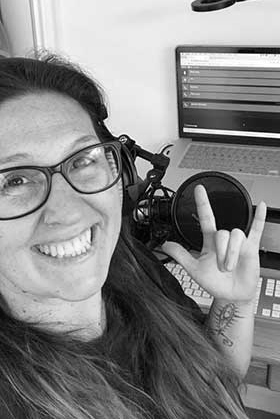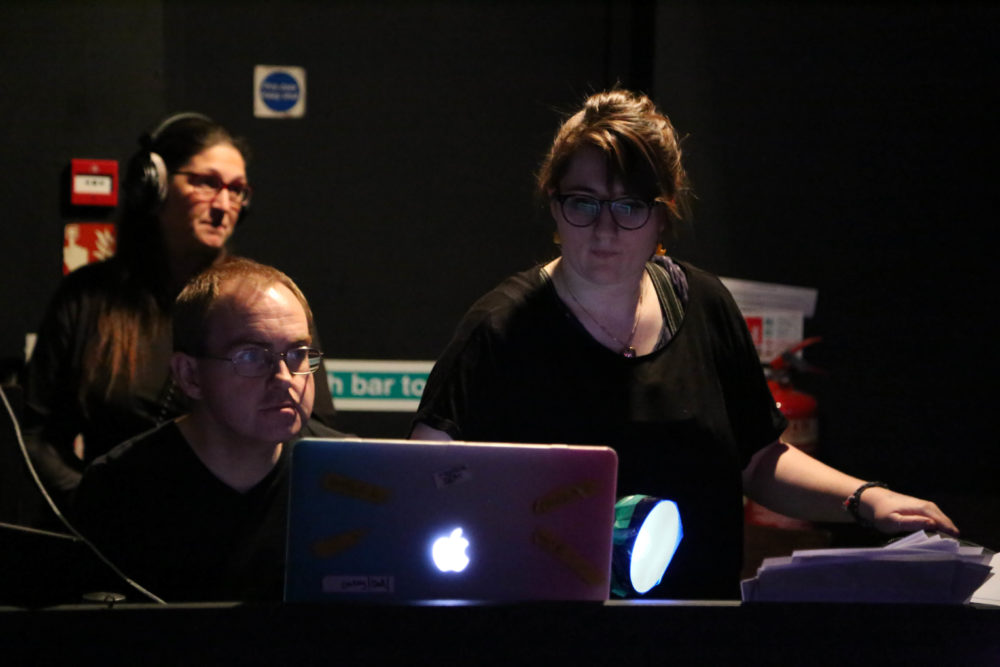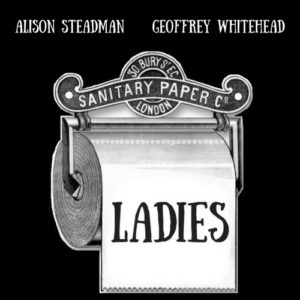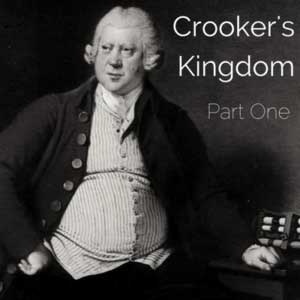
Tshari King is the fantastic sound engineer behind many live Wireless Theatre productions. Described as “extremely well prepared and brilliantly thorough”, her talents extend beyond live theatre to audiobooks, podcasts, even multicast audio drama. We quizzed Tshari on all of this and more.
” I felt more connected with the performance when I was doing sound”
Tshari King
When did you begin your career as a sound engineer? How did you get started? What drew you to sound engineering?
I first found my love for sound when I was studying technical theatre and stage management at LAMDA. I had initially been interested in lighting and stage management, but fell in love with audio during my first year. After I graduated I worked any job that I could and although I did a few sound designs for some very tiny fringe shows, I drifted away from sound as there were more opportunities in other departments. A few years later I realised that the sound department was where I wanted to be so I found a college offering short intensive courses in Sound Engineering and Audio Production and took their studio course followed by their live sound course. I can’t put my finger on what attracted me to sound to start off with. I think it’s the thrill of live performance that I really love – operating equipment that supports that performance. I felt more connected with the performance when I was doing sound than in the departments.
How did you get involved with Wireless Theatre?
Whilst I was re-training in sound engineering, a friend of my boyfriend at the time was helping Wireless out with one of their famous live shows (a radio drama recorded in front of a live audience). He came from a music production background and was unsure of some of the more theatre like aspects of the production, so I went in to help out. We worked as a double act, with him doing the recording and editing and me providing pre-recorded sound effects and operating the live shows. The rest as they say, is history.

What do you most enjoy about your work?
I love the variety of my work. I work in theatre, in live sound and events and also in recorded spoken word projects recording and editing audiobooks, audio dramas, and podcasts. I’ve sound designed for stage and audio drama, I get to teach people and I get to work with amazing people. I love working with a team to put on a show. I get a great joy from being part of something that can entertain, educate, enlighten, and bring joy to an audience; telling different stories and perspectives.
” I get a great joy from being part of something that can entertain, educate, enlighten and bring joy “
Tshari King
What are the most challenging situations you have found yourself in professionally, and how did you overcome them?
The most challenging thing is time. There is never enough – no matter the project. This is especially relevant in live events and I remember it acutely with our Wireless live productions. We learnt very fast that you have to be as prepared as humanly possible before getting to the venue as we often only have a matter of hours between getting into a space and performing (and recording!) in front of a live audience.
If you could relive one project from your working life, which would it be and why?
It would have to be the 2018 St Maarten Heineken Regatta. I had a great time and worked with some amazing people. I also made new friends, and was right there on the side stage whilst some amazing talented people performed.



A selection of plays Tshari has recorded and edited for Wireless Theatre
What has been your proudest professional moment so far?
Every show I do is my proudest moment – a live event happening without incident and with the audience leaving happy is my proudest moment, every time.
“Take time to learn your software of choice and be confident in your craft”
Tshari King
What are your top tips for someone who would like to become a sound engineer in audio drama?
Formal education aside, take time to learn your software of choice and be confident in your craft. Make sure you have a website or somewhere prospective employers can hear samples of your work – even if it’s projects that you have created purely for your portfolio. Befriend an actor or a friend who is willing to be recorded and work with them to choose a piece that you can record and then take your time editing or sound designing it. Then you can start approaching production companies. I am a big believer in offering something for free to allow a company to see what I can do – a 5 min sample of your editing or sound design skills demonstrates your abilities to a potential client. For studio work, it’s often who you know rather than what you know. You could offer a few hours of your time helping out; this gives you a chance to watch and learn, but also to get to know the people there.
What are you working on at the moment?
These days I spend a lot of my time editing audiobooks and podcasts. I’m currently editing a book on philosophy narrated by the amazing Matt Addis.
Have you heard any great audio dramas or podcasts lately? Is there anything you would like to recommend?
I had the pleasure of working on Marty Ross’s Sleeping Beauty for Audible which came out at Christmas and was not only a pleasure to work on but also to listen to. I also recently listened to Robert Valentine’s adaptation of Howl’s Moving Castle on BBC Sounds which I really enjoyed. For all those soundie folk out there, my favourite podcast is 20 Thousand Hertz which talks about the stories behind sounds that we hear in our lives.
Where can listeners enjoy your work?
The Wireless Theatre Company website has many of my past productions, plus I am proud to say, Audible too. Check out my website for links to projects I have worked on.
Image of Tshari © Tshari King and Wireless Theatre Ltd 2022 reproduced with permission.

Bravo